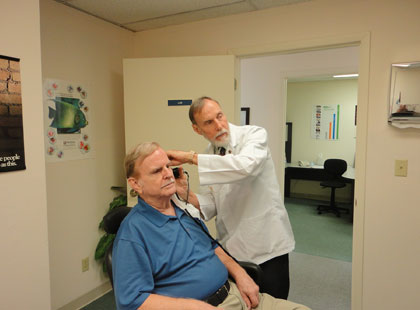
Ear issues and hearing loss impact people of all ages. Hearing loss can affect our ability to communicate by impacting our speech and language skills which can result in social isolation. Our physicans and highly-trained audiologists collaborate to deliver the most state-of-the-art diagnostic and therapeutic care to our patients. We are dedicated to our patient care from infancy to adulthood.Hearing loss that occurs gradually as you age (presbycusis) is common. About one-third of people in the
United States between the ages of 65 and 75 have some degree of hearing loss. For those older than 75, the number of people with some hearing loss is almost 1 in 2.Doctors believe that heredity and chronic exposure to loud noises are the main factors that contribute to hearing loss over time. Other factors, such as excessive earwax, can temporarily prevent your ears from conducting sounds. You can't reverse hearing loss. However, you don't have to live in a world of muted, less distinct sounds.
Signs and symptoms of hearing loss may include:
- Muffling of speech and other sounds
- Difficulty understanding words, especially against background noise or in a crowd of people
- Trouble hearing consonants
- Frequently asking others to speak more slowly, clearly and loudly
- Needing to turn up the volume of the television or radio
- Withdrawal from conversations
- Avoidance of some social settings
Causes of hearing loss include:
Damage to the inner ear. Aging and prolonged exposure to loud noise may cause wear and tear on the hairs or nerve cells in the cochlea that send sound signals to the brain. When these hairs or nerve cells are damaged or missing, electrical signals aren't transmitted as efficiently, and hearing loss occurs. Higher pitched tones may become muffled to you.
It may become difficult for you to pick out words against background noise. Heredity may make you more prone to these changes. This type of hearing loss is known as sensorineural hearing loss, which is permanent.
A gradual buildup of earwax. Earwax can block the ear canal and prevent conduction of sound waves. Earwax blockage is a cause of hearing loss among people of all ages. This can be restored with earwax removal.
Ear infection and abnormal bone growths or tumors. In the outer or middle ear, any of these can cause hearing loss.
Ruptured eardrum (tympanic membrane perforation). Loud blasts of noise, sudden changes in pressure, poking your eardrum with an object and infection can cause your eardrum to rupture and affect your hearing.
 Ear issues and hearing loss impact people of all ages. Hearing loss can affect our ability to communicate by impacting our speech and language skills which can result in social isolation. Our physicans and highly-trained audiologists collaborate to deliver the most state-of-the-art diagnostic and therapeutic care to our patients. We are dedicated to our patient care from infancy to adulthood.Hearing loss that occurs gradually as you age (presbycusis) is common. About one-third of people in the United States between the ages of 65 and 75 have some degree of hearing loss. For those older than 75, the number of people with some hearing loss is almost 1 in 2.Doctors believe that heredity and chronic exposure to loud noises are the main factors that contribute to hearing loss over time. Other factors, such as excessive earwax, can temporarily prevent your ears from conducting sounds. You can't reverse hearing loss. However, you don't have to live in a world of muted, less distinct sounds.
Signs and symptoms of hearing loss may include:
Ear issues and hearing loss impact people of all ages. Hearing loss can affect our ability to communicate by impacting our speech and language skills which can result in social isolation. Our physicans and highly-trained audiologists collaborate to deliver the most state-of-the-art diagnostic and therapeutic care to our patients. We are dedicated to our patient care from infancy to adulthood.Hearing loss that occurs gradually as you age (presbycusis) is common. About one-third of people in the United States between the ages of 65 and 75 have some degree of hearing loss. For those older than 75, the number of people with some hearing loss is almost 1 in 2.Doctors believe that heredity and chronic exposure to loud noises are the main factors that contribute to hearing loss over time. Other factors, such as excessive earwax, can temporarily prevent your ears from conducting sounds. You can't reverse hearing loss. However, you don't have to live in a world of muted, less distinct sounds.
Signs and symptoms of hearing loss may include: